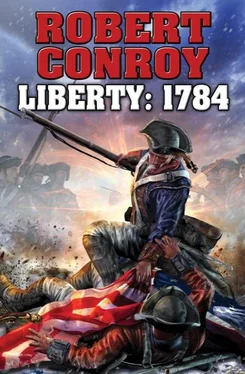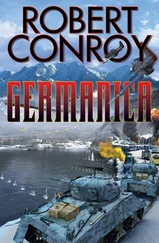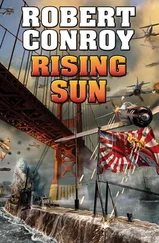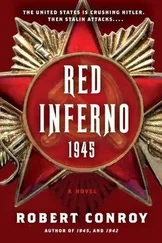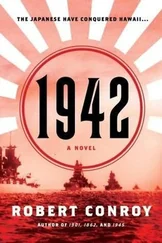Robert Conroy - Liberty - 1784
Здесь есть возможность читать онлайн «Robert Conroy - Liberty - 1784» весь текст электронной книги совершенно бесплатно (целиком полную версию без сокращений). В некоторых случаях можно слушать аудио, скачать через торрент в формате fb2 и присутствует краткое содержание. Жанр: Альтернативная история, на английском языке. Описание произведения, (предисловие) а так же отзывы посетителей доступны на портале библиотеки ЛибКат.
- Название:Liberty: 1784
- Автор:
- Жанр:
- Год:неизвестен
- ISBN:нет данных
- Рейтинг книги:4 / 5. Голосов: 1
-
Избранное:Добавить в избранное
- Отзывы:
-
Ваша оценка:
- 80
- 1
- 2
- 3
- 4
- 5
Liberty: 1784: краткое содержание, описание и аннотация
Предлагаем к чтению аннотацию, описание, краткое содержание или предисловие (зависит от того, что написал сам автор книги «Liberty: 1784»). Если вы не нашли необходимую информацию о книге — напишите в комментариях, мы постараемся отыскать её.
Liberty: 1784 — читать онлайн бесплатно полную книгу (весь текст) целиком
Ниже представлен текст книги, разбитый по страницам. Система сохранения места последней прочитанной страницы, позволяет с удобством читать онлайн бесплатно книгу «Liberty: 1784», без необходимости каждый раз заново искать на чём Вы остановились. Поставьте закладку, и сможете в любой момент перейти на страницу, на которой закончили чтение.
Интервал:
Закладка:
At his command, men ran forward and cleared away enough of the thicket to permit horsemen to ride through them in a column of twos. He signaled and his men rode their horses forward at the trot. They could not gallop. In his opinion, half of the nags would collapse and die if they tried it. They were less than a hundred yards away from the side of the British phalanx; most of whom didn’t even see his men, so preoccupied were they with advancing forward over their dead and dying comrades. Those who did turn and see just looked on incredulously. Not a shot was fired in the direction of the small force of American cavalry, and it occurred to Washington that the British weapons were empty to prevent accidentally shooting their own side.
Will was with Washington’s force and soon found himself in the position of being behind both the main British army and out of sight of the British force that had just disappeared over the hill.
“Now what?” he asked of Washington.
Washington winked. “Damned if I know. Never thought we’d get this far and still be alive. See those cannon to our right front?” Will did. “Why don’t we ride over there and take them?”
With yells and whoops, Washington’s hundred-odd cavalry trotted towards the two pair of guns that had been firing ineffectively at the American works.
Some of the gunners ran, but most tried to defend their weapons with pistols and cutlasses. Washington’s men responded with the blunderbuss-like Franklins and sabers.
Will slashed at a British sailor and saw him fall. Another tried to pull him from his horse, but Will hit him on the head with the handle of his sword, while, a moment later, another American ran the man down with his horse.
It was over in a couple of minutes. A dozen dead British and half as many Americans littered the field. The remainder of the British contingent was running in all directions. It was a sweet little victory, Will thought. It felt good, damned good, to finally come to grips with the enemy, and even better to win a fight, however small.
Will Washington was flushed but happy. He’d come to the same conclusion. He looked at the four cannon and grinned. “Anybody here know how to work these damned things?”
“I do, at least a little bit,” Will heard himself say.
Washington grinned engagingly. “Damned if you aren’t a man of parts, Drake.”
* * *
Astonished by the surprisingly overwhelming British response to their foray, Owen led his men back into the swamp where they continued to snipe at the British who were lined up at its edge, apparently unwilling to get their feet wet. Girty’s men, never the bravest, were holding back, content with occasionally firing their rifles at some target visible only to themselves.
Owen had received a few dozen reinforcements and was using them to good effect. The British force now numbered several hundred men and, if they chose to advance into the swamp, could easily push him back and leave the way open to the American rear. He could not allow that to happen, although it seemed that, at least for the moment, the British had little intention of trying it. He saw a man he presumed to be some general running around and waving a sword. Just out of range, he decided, and Barley concurred. Too bad, they both concluded. It would be great to take down a British general.
* * *
The American army was dying.
Nearly half of von Steuben’s Hessians were dead or badly wounded or crawling back to find help that didn’t exist. The same was true with Morgan’s men. There were just too many British and, no matter how hard or how desperately the Americans fought, additional Redcoats clambered over the growing pile of bodies to hack and slash at the dwindling number of rebels.
Musket fire had ceased to be effective and the battlefield was strangely void of the sound of gunfire, with only howls and screams being heard. Slowly, the Americans were forced back from the earthworks. As the rebels fell back, the British instinctively stretched their lines to the left and right in an attempt to overlap the Americans. In desperation, Stark called for Wayne to attack from his flank even though it meant virtually abandoning the works confronting a strangely quiet Tarleton. It was a chance that had to be taken. Every chance had to be taken.
General John Stark stood a few feet behind the churning, howling mass of humanity that was the battle. His orders to Wayne meant he had no more men left. It was over. He had no other troops to add. Now the real dying would begin.
He turned to Daniel Morgan who had painfully struggled out of his litter. Stark drew his sword and shrugged. “Live free or die,” he said softly. “Time to make good on that statement, isn’t it, Daniel?”
Morgan grinned and drew a pistol and a tomahawk from his belt, while Stark pulled out one of Franklin’s maces. “As good a time as any, I’d say.”
Both men bulled their way into the savage fighting.
* * *
Tarleton read the order and dismissed it. Burgoyne wanted him to use the regiments at his disposal to attack the American lines directly in front of him, the very same defenses that had cost him so dearly just a few days earlier. Didn’t the man realize that nothing had been done to reduce them?
Apparently Burgoyne thought that the rebels had abandoned their works and sent all their men to support those trying to stop the advance of the British phalanx
But why, Tarleton wondered. The phalanx seemed to be making progress and Redcoat soldiers were beginning to lap over the rebel works like an irresistible wave. And yes, he could hear guns firing to his left and beyond the main British thrust, but surely Arnold had things well in hand. The man might be a turncoat and a traitor, but he was a damned good fighting general for all that.
No, Tarleton thought. He would not advance, at least not yet. His original orders called for him to attack when the main attack broke through and that must be what Burgoyne was reminding him of. With just a little more than a thousand men at his disposal, even a small number of rebels behind their defenses could stymie him and cause enough casualties to result in another sardonic tongue-lashing from his beloved commanding general. Another debacle as perceived by Burgoyne might be injurious to Tarleton’s career.
Tarleton smiled. He would not attack. At least not just yet, he repeated. If Burgoyne had gotten himself into trouble, he had more than enough men to solve his own problem. He, Banastre Tarleton, would wait for the right moment and then strike. That, he decide, would be the way to win glory for himself and erase any memories of the disaster at Cowpens.
* * *
The naval gun carriages had been built for use on a ship and were designed to be stabilized and controlled by ropes and pulleys. On land they were awkward and cumbersome and prone to topple over. However, some clever minds in the British Army had figured out how to stabilize them through the use of strong tree limbs that projected in various directions.
The British were not able to develop wheels for the cannon, which meant that the American soldiers who had captured them had to use muscle power and their horses to drag them into a better position to damage the British advance.
After what seemed like forever, the American cavalrymen wrestled the four guns-two four pounders and two nine pounders-into position. Under Drake’s cautious direction, they charged them with powder and poured a combination of rocks and trash down their muzzles. Drake wasn’t certain just how much powder the guns took, so he intentionally underloaded them. At least he hoped he had. An exploding cannon could kill a lot of men.
Curiously, the British rear ranks seemed oblivious to what they were doing; the British were totally fixated on the bloody action to their front. They probably thought the men working the guns were British, he concluded.
Читать дальшеИнтервал:
Закладка:
Похожие книги на «Liberty: 1784»
Представляем Вашему вниманию похожие книги на «Liberty: 1784» списком для выбора. Мы отобрали схожую по названию и смыслу литературу в надежде предоставить читателям больше вариантов отыскать новые, интересные, ещё непрочитанные произведения.
Обсуждение, отзывы о книге «Liberty: 1784» и просто собственные мнения читателей. Оставьте ваши комментарии, напишите, что Вы думаете о произведении, его смысле или главных героях. Укажите что конкретно понравилось, а что нет, и почему Вы так считаете.
